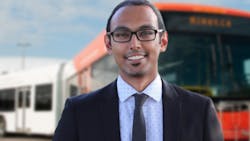One word to describe yourself: Solutionist
Alma Mater: University of Guelph, Canada and Wilfrid Laurier University, Canada
Fast fact about yourself: I am an avid chess player and won tournaments in my younger days.
What’s your best experience on transit and what made it memorable? When I was travelling in Europe, I used Trentitalia to get from city to city, both domestically and international. This was memorable because this was my first high-speed rail experience.
Stephen Bacchus, MBA, PMP, B.Eng, manager, transit fleet, engineering and asset management for the city of Mississauga, Ontario, is directly responsible for the asset management strategies, policies and objectives for roughly 500 Mississauga transit buses and 80 transit support vehicles, with an estimated replacement value of over C$620 million (US$438.9 million). He manages the technical support, procurement, asset management and data analytics teams that provide evidence-based recommendations to inform budgets, strategic plans and operations and maintenance. He also leads the design, planning and implementation of innovative zero-emission fleet projects.
During the past few years, Bacchus and his team have implemented many important projects that have benefited the city from a social, environmental and economic sustainability perspective. In 2019, the city of Mississauga declared a climate emergency and as a result made ambitious targets to reduce greenhouse gas (GHG) emissions by 80 percent by 2050. Bacchus has an important role to play to achieve this goal, as transit buses alone make up more than 70 percent of the city’s total GHG inventory.
Bacchus submitted a Socio-Economic Business Case to the government of Canada and the government of Ontario to request C$360 million (US$263.3 million) to purchase only low-emission hybrid-electric buses instead of conventional diesel buses to achieve the city of Mississauga’s climate change goals. With this approved funding, Bacchus purchased 165 hybrid-electric buses to replace aging diesel buses in 2023, which is the most buses purchased in a single year in Mississauga history. The hybrid-electric buses are 30 percent more fuel efficient than the average diesel bus.
He also implemented further fuel consumption reduction improvements on the hybrid buses, which include stop/start technology, aggressive braking regeneration and EV Geo-Fencing. MiWay was the first transit agency in North America to implement an EV Geo-Fencing project that was first piloted in 2022. Since then, it has been a success by further reducing CO2 emissions.
Bacchus is the Mississauga lead for the Pan-Canadian Hydrogen Fuel Cell Electric Bus (FCEB) Demonstration Trial. The project aims to have 10 FCEBs in Mississauga, which would be the first hydrogen FCEB operating in Ontario. In 2022 and 2023, Bacchus led the installation of 49 Level 2 electric vehicle charging connections. The chargers were installed in 2022 to support the purchase of 25 battery-electric transit support vehicles in 2023.
As a volunteer within the community, Bacchus also actively participates on various industry-wide committees. He is currently involved with the Canadian Urban Transit Association (CUTA), as the secretary on the Maintenance and Vehicle Engineering Committee, which aims to encourage best practices in the industry by way of research and development and through the exchange of information. He is also the vice chair on the Zero-Emission Bus Committee at Ontario Public Transit Association (OPTA), where he leads a team focused on conventional bus, paratransit and non-revenue vehicle commercial management and engaging with the private sector on collaboration opportunities with transit agencies.
In addition, Bacchus was a member of Shelter Bus, which is an initiative that repurposed a coach bus with a kitchenette, bathroom and beds for homeless people in the colder winter months to sleep at night.
Is there a specific experience that led you to where you are today?
I would not say there is one specific experience that led me to where I am today but rather a collection of experiences based on my evolving interests and ambitions. While I was in school, I was offered a summer internship at a company that sold transit bus parts. At the time, I had no experience in this field but quickly realized the impact that this small facility had on the wider transit industry.
When a bus is sitting on a hoist waiting for parts, that means that the bus is not out there transporting passengers where they need to be. Although to many, this job did not seem significant in the grand scheme of things, it did contribute to larger impacts downstream.
I found the transit industry very important from a socio-economic perspective from this moment on. As I progressed throughout my career, I found ways to integrate my engineering, business, finance and strategic expertise into the public transit space.
What do you enjoy most about your job?
It’s hard to choose just one thing that I enjoy most about my job but I’ll say I enjoy knowing passengers use the public transit system that we manage. Seeing how each person is on their own journey while taking public transit brings me a sense of fulfillment to see how these buses positively impact the community by making transportation accessible and convenient for everyone.
Each time I see a passenger hop on board, I’m reminded of the difference we’re making in people's daily lives, helping them reach their destinations with ease and reliability. It’s truly rewarding to be part of a system that connects the community in this way.
What’s the most challenging part of your job?
From an asset management perspective, I am always working to balance levels of service and asset risk while also considering fiscal responsibility and stakeholder interests. During the past few years in particular, the price of new assets, as well as the cost of maintaining infrastructure assets in a state of good repair, have been increasing. To meet and/or exceed both technical and community levels of service such as operational performance, asset reliability, customer satisfaction, safety, capacity and environmental sustainability within our transit system, there is a cost to do so.
Funding has, and will always remain, a challenge. To address this challenge, I develop business cases for both internal and external funding. Effective asset management for our public infrastructure is critical to understand the funding deficits and impact of investment in public transit.
Accomplishment you’re most proud of and why?
To decarbonize the city of Mississauga’s transit fleet, I am always looking for creative ways to further decrease GHG emissions. In 2023, my team (Transit Fleet Asset Management & Engineering) successfully implemented an EV Geo-Fencing Project on all hybrid-electric buses. The way this technology works – as a hybrid-electric bus enters a specified zone (such as a school, hospital, mall), the bus will shut off its engine and operate in full battery-electric mode while also having the speed limited to match posted limits. Once the bus leaves the zone, the engine will come back on and the batteries will begin charging again for a future cycle.
Mississauga was the first transit agency in North America to pilot this technology, which was then adopted by other agencies. The outcome of the project resulted in the reduction of 59,890 kgCO2e per month for all hybrid-electric buses. Since the buses operate in engine-off mode within these EV Zones, passengers and residents experience less air and noise pollution, resulting in better health for the residents of our community.
In addition, hybrid-electric buses operating within these EV Zones are programmed to have top speed limits, resulting in safer operation. I am proud of our team for taking on a challenging, transformational and innovative initiative and being the trailblazers for similar projects to come in the near future.
What is an accomplishment you would like to work towards in your career?
Aside from all the great things I intend to accomplish short-term within the public transit industry, I would like to create an environment where policy-makers at all levels of government recognize the significance of all public infrastructure such as roads, bridges, water, facilities and other asset infrastructure classes as an essential driver of community prosperity.
There may be a day where we all understand a dollar of investment in public infrastructure will translate to many more dollars in socio-economic development. Public infrastructure enables our community’s productivity, quality of life, economic progression and strengthens growth by providing the supporting networks upon which we all rely on.
Best advice/tip/best practice to share from your area of expertise?
In my line of work, it is essential to thoughtfully explore all possible options and solutions when solving a particular challenge even though they may be unconventional or unorthodox. The decision-making process should be collaborative, bringing together staff that affect or are affected by the outcomes of the decisions and solutions. This will require the right people, with the right knowledge, having the right qualifications, to make the right decision. By leveraging the diverse strengths and insights of these staff members, we can feel confident that the decision we ultimately make is well-informed, innovative and effective while dealing with competing interests.
About the Author
Brandon Lewis
Associate Editor
Brandon Lewis is a recent graduate of Kent State University with a bachelor’s degree in journalism. Lewis is a former freelance editorial assistant at Vehicle Service Pros in Endeavor Business Media’s Vehicle Repair Group. Lewis brings his knowledge of web managing, copyediting and SEO practices to Mass Transit magazine as an associate editor. He is also a co-host of the Infrastructure Technology Podcast.

